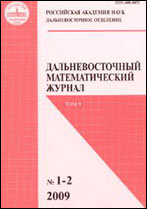|
|
Dal'nevostochnyi Matematicheskii Zhurnal, 2009, Volume 9, Number 1-2, Pages 15–23
(Mi dvmg15)
|
 |
|
 |
This article is cited in 1 scientific paper (total in 1 paper)
The defect of weak approximation for homogeneous spaces. II
M. V. Borovoi
Tel Aviv University, School of Mathematical Sciences
Abstract:
Let $X$ be a right homogeneous space of a connected linear algebraic group $G'$ over a number field $k$, containing a $k$-point $x$. Assume that the stabilizer of $x$ in $G'$ is connected.
Using the notion of a quasi-trivial group introduced by Colliot-Thélène, we can represent $X$ in the form $X=H\setminus G$, where $G$ is a quasi-trivial $k$-group and $H\subset G$ is a connected $k$-subgroup.
Let $S$ be a finite set of places of $k$. We compute the defect of weak approximation for $X$ with respect to $S$ in terms of the biggest toric quotient $H^{\rm tor}$ of $H$. In particular, we show that if $H^{\rm tor}$ splits over a metacyclic extension of $k$, then $X$ has the weak approximation property.
We show also that any homogeneous space $X$ with connected stabilizer (without assumptions on $H^{\rm tor}$) has the real approximation property.
Key words:
linear algebraic groups, homogeneous spaces, weak approximation.
Received: 07.04.2009
Citation:
M. V. Borovoi, “The defect of weak approximation for homogeneous spaces. II”, Dal'nevost. Mat. Zh., 9:1-2 (2009), 15–23
Linking options:
https://www.mathnet.ru/eng/dvmg15 https://www.mathnet.ru/eng/dvmg/v9/i1/p15
|

|




 Contact us:
Contact us: Terms of Use
Terms of Use
 Registration to the website
Registration to the website Logotypes
Logotypes








 Citation in format
Citation in format 
